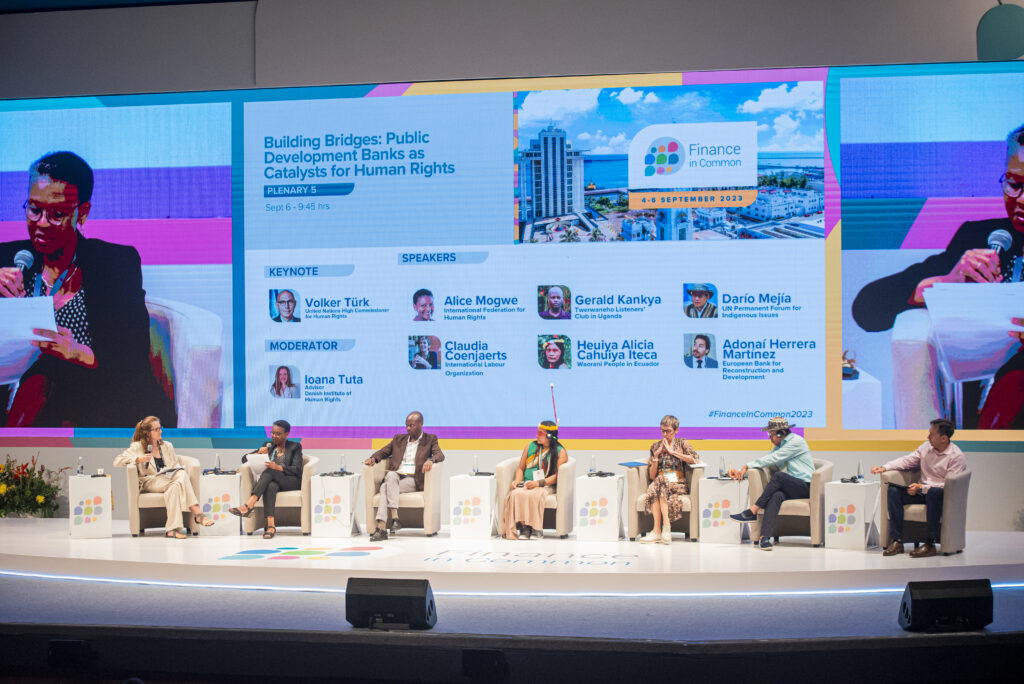PLENARY 5 (DAY 3)
Public institutions and development banks seek to deepen actions for the fulfillment of Human Rights and the 2030 Agenda
- Representatives from international organizations (such as the United Nations) and Human Rights NGOs made a new call from Cartagena to search for new tools for public development banks to implement a Human Rights-based approach.
- A Human Rights-based approach aims to guarantee the right to a healthy and safe environment, as well as equality of opportunity, non-discrimination, and social justice.
- During the previous edition of Finance in Common, five international organizations signed a declaration to engage public financial institutions in achieving the 2030 Agenda in regards to Human Rights.
- Two new signatories, the Banque Ouest Africaine de Développement (BOAD) and the Small Industries Development Bank of India (SIDBI), joined the Paris Development Bank’s Declaration on Gender Equality and Women’s Empowerment.
Cartagena (Colombia), September 6, 2023. Representatives from international organizations (such as the United Nations) and NGOs made a new call from Cartagena for public development banks to search for tools to implement a Human Rights-based approach. The call came almost a year after the signing of a declaration during the Finance in Common Summit in 2022 held in Abidjan, Ivory Coast, to further integrate Human Rights into the work and purposes of public development banks worldwide.
The joint declaration, signed by the International Fund for Agricultural Development, the European Investment Bank, the French Development Agency, the European Council Development Bank, and the European Bank for Reconstruction and Development, drew attention since 2022 to the commitment made by public banks to steer the Human Rights based approach to development towards fulfilling the sustainable development goals set by the 2030 Agenda (90% of the Sustainable Development Goals contain Human Rights provisions in force).
During Plenary 5 of the fourth edition of the Finance in Common Summit, representatives of institutions and NGOs restated the role of development financial organizations as a cornerstone not only to achieve the SDGs but also for a Human Rights-based approach. On the one hand, a Human Rights based approach seeks to ensure the right to a healthy and safe environment; on the other hand, it aims for equality of opportunity, non-discrimination, and social justice.
Likewise, the plenary enabled making a new call for the efforts of the world’s public development banks to advance towards fulfilling the SDGs through a more precise focus on financial efforts guided by a Human Rights-based perspective.
More efforts for gender equality and women’s empowerment.
As part of the effort promoted by the Gender Coalition of Finance in Common to promote gender equality and the empowerment of women and girls worldwide, two new signatories to the Paris Development Bank’s Declaration on Gender Equality and Women’s Empowerment were announced during Plenary 5: the Banque Ouest Africaine de Développement (BOAD) and the Small Industries Development Bank of India (SIDBI).
With the adherence of these two new banks, there are now 44 institutions joining efforts to strengthen the financing of gender-related projects and the development of institutional strategies addressed at this same goal. This Declaration also established the goal of aligning gender equality with the challenges of climate commitments and biodiversity.
Public development banks worldwide have been instrumental in facilitating women’s access to finance and financial services. This has undoubtedly created a favorable environment aligned with the strengthening of gender equality (contained in Sustainable Development Goal number 5).
Strengthened institutions become frontline gender advocates in their respective countries, setting an example for their peers and stakeholders; they may also gain access to more international financing opportunities to continue their mission.
The speakers in the plenary included Volker Türk, the United Nations High Commissioner for Human Rights; Alice Mogwe, President of the International Federation for Human Rights; Claudia Coenjaerts, Deputy Regional Director of the International Labor Organization for Latin America; Gerald Kankya, Director of the Twerwaneho Listeners Radio Club (TLC) NGO; Hueiya Alicia Cahuiya Iteca, President of the Women of the Waorani Association of the Ecuadorian Amazon; Dario Mejía, President of the United Nations Permanent Forum on Indigenous Issues; and Adonaí Herrera – Martínez, Director of the Environment and Sustainability Department of the European Bank for Reconstruction and Development.
Darío Mejía, President of the Permanent Forum on Indigenous Issues stated that “indigenous peoples are not a population category. They are basically the subjects of human rights. This condition is founded on their origin; they are cultures, societies, and governments that existed before states were organized. They have a voice of their own. There are more than 476 million people who are part of indigenous peoples around the world. We need to give these good intentions a share of sound action. This entails not taking certain terms as facts, such as bioeconomy or nature-based solutions.”
Likewise, Hueiya Alicia Cahuiya Iteca, President of the Ecuadorian Amazon Waorani Women’s Association (Asociación Mujeres Waorani de la Amazonía Ecuatoriana), called on pubic development Banks to dialogue with indigenous peoples to defend the Amazon and prioritize sustainable actions that preserve biodiversity and the rights of communities.
Alice Mogwe, President of the International Federation for Human Rights, stated that “I would like to call on development banks to respect and protect human rights. Also, to screen Human Rights- associated risks. Rights are relevant in every stage of the banks’ project cycle.”
The road ahead faces substantial challenges, as noted in the United Nations SDGs. Conflicts around the world, insecurity, limited access to justice, and institutional weakness are some of the factors threatening sustainable development.
According to data from the Office of the United Nations High Commissioner for Refugees (UNHCR), there are currently more than 70 million people around the world who are fleeing and seeking refuge from wars, persecutions, and conflicts around the planet. As stated by the UNHCR, this is the highest figure in seven decades.


